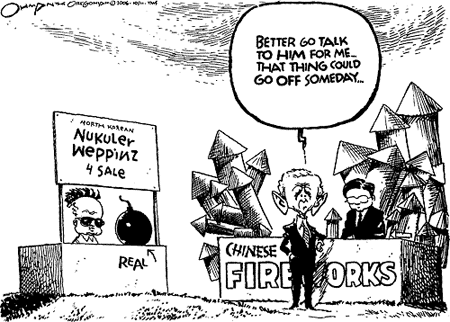

A private U.S. study said in Jan. 28. 2009 that the United States and its allies might have to deploy up to 460,000 soldiers to North Korea to stabilize the country if it collapses and an insurgency erupts. A failed succession upon Kim Jong-Il's death would result the country descends into total chaos and foreign troops intervene. Kim, 66, had named his third son, Kim Jong-Un, 24, as successor. Kim is reported to have suffered a stroke in August. 2008. The Council on Foreign Relations (CFR) think tank outlined North Korea abuts two great powers - China and Russia - that have important interests at stake in the future of the peninsula. That they would become actively engaged in any future crisis involving North Korea is virtually guaranteed and military intervention by foreign powers was not rule out. The same prospect of North Korea being absorbed by South Korea and U.S. forces potentially being deployed near China's northeastern border are matters of acute concern helped trigger China's entry into the Korean War. Moscow undoubtedly shares many of Beijing's concerns, though Russia appears less poised to intervene should the situation deteriorate. Stabilization force as many as twenty occupying troops are needed for every thousand persons, implying a force of 460,000 troops in an insurgency. Such a force would be more than three times the number of U.S. troops in Iraq. A possible breakdown over North Korea's stockpile of weapons of mass destruction (WMDs) would likely provide even stronger pressures to intervene. Although neighboring states share a common interest in preventing leaking of WMDs, materials and technologies beyond the North's borders, an urgent priority, serious differences could still arise over the necessity and execution of any military operation designed to secure WMDs.
To avert the worst the report urged close cooperation between the United States, China and other players in the region to cooperate.  Beijing could bring North Korea into line tomorrow—if it really wanted to. China has the military, economic, and political power not only to pressure North Korea to discard its bomb but to topple its regime altogether. Should China's leaders want to see the North Korean regime fall, after all, they don't need to play around with sanctions or blockades. Instead, they could cut off energy supplies to Pyongyang. Or food deliveries to Pyongyang. Or end all trade with Pyongyang. Or, to make things even quicker and simpler, China could deploy the same tactic that once upon a time led to the collapse of East Germany: Instead of closing the 800-mile Chinese-North Korean border to goods, the Chinese could open it to people.
Beijing could bring North Korea into line tomorrow—if it really wanted to. China has the military, economic, and political power not only to pressure North Korea to discard its bomb but to topple its regime altogether. Should China's leaders want to see the North Korean regime fall, after all, they don't need to play around with sanctions or blockades. Instead, they could cut off energy supplies to Pyongyang. Or food deliveries to Pyongyang. Or end all trade with Pyongyang. Or, to make things even quicker and simpler, China could deploy the same tactic that once upon a time led to the collapse of East Germany: Instead of closing the 800-mile Chinese-North Korean border to goods, the Chinese could open it to people.
VIA
This site requires Quick time to play its audio player if need.
----------------------------------------------
"A penny for your thoughts"
----------------------------------------------
"A penny for your thoughts"
You are here: Home > Reality > The dilemma if N. Korea Collapses
Monday, March 2, 2009
The dilemma if N. Korea Collapses
I'm reading: The dilemma if N. Korea CollapsesTweet this!
Posted by
BigCloud
at
7:30 PM

Labels: Reality | Hotlinks: DiggIt! Del.icio.us
Subscribe to:
Post Comments (Atom)







0 Comments:
Post a Comment